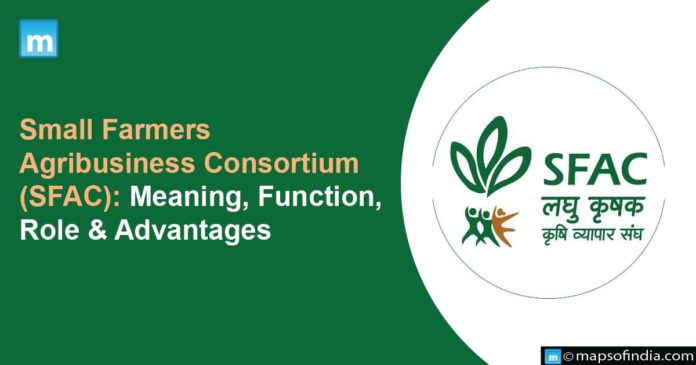SFAC stands for Small Farmers Agribusiness Consortium. It is a Government of India initiative that was established in 1994. The primary objective of SFAC is to support small and marginal farmers to improve their productivity and profitability by facilitating their participation in agribusiness activities. This article discusses the background, functions, roles, and advantages of SFAC in India.
Background
The Ministry of Agriculture first proposed the idea of SFAC in the early 1990s. The primary objective was to create a platform for small and marginal farmers to participate in agribusiness activities. The government recognized that the small and marginal farmers, who constitute around 85% of the farming community in India, face numerous challenges, such as a lack of access to finance, technology, and market linkages. SFAC was established in 1994 as a registered society under the Ministry of Agriculture and Farmers’ Welfare, Government of India.
Functions and Roles
SFAC bridges the gap between small and marginal farmers and the market. Some of the key functions and roles of SFAC are:
-
Facilitating agribusiness activities
SFAC facilitates agribusiness activities by providing farmers with technical, managerial, and financial support. SFAC supports farmers in crop diversification, value addition, marketing, and export promotion.
-
Promoting farmer-producer organisations
SFAC promotes the formation of farmer-producer organizations (FPOs) to help small and marginal farmers to access markets, finance, and technology. FPOs act as a platform for small farmers to come together and engage in collective marketing, procurement, and value-addition activities.
-
Providing market intelligence
SFAC provides market intelligence to farmers to help them make informed decisions on crop selection, pricing, and marketing. SFAC regularly studies market trends, demand-supply dynamics, and export opportunities in various agricultural commodities.
-
Facilitating access to credit
SFAC facilitates access to credit for small and marginal farmers by creating linkages between farmers and financial institutions. SFAC also assists FPOs financially to strengthen their financial management and creditworthiness.
-
Capacity building
SFAC conducts training programs for farmers and FPOs to build their capacity in crop production, post-harvest management, value addition, marketing, and export promotion.
Advantages
SFAC has several advantages for small and marginal farmers in India. Some of the key advantages are:
- Access to markets: SFAC provides small and marginal farmers with access to domestic and international markets. SFAC facilitates linkages between farmers and buyers, enabling farmers to sell their produce at remunerative prices.
- Access to finance: SFAC facilitates access to credit for small and marginal farmers. SFAC also assists FPOs financially to strengthen their financial management and creditworthiness.
- Technology adoption: SFAC facilitates the adoption of modern technologies in agriculture by small and marginal farmers. SFAC provides technical assistance to farmers on crop selection, crop management, and post-harvest management.
- Diversification: SFAC promotes crop diversification, which helps small and marginal farmers to reduce their dependence on a single crop. Diversification helps farmers to manage risk, improve productivity, and access new markets.
- Empowerment: SFAC empowers small and marginal farmers by creating FPOs. FPOs act as a platform for small farmers to come together and engage in collective marketing, procurement, and value-addition activities. FPOs help small farmers to improve their bargaining power and access new markets.




